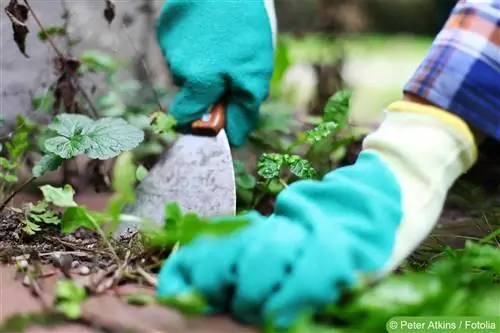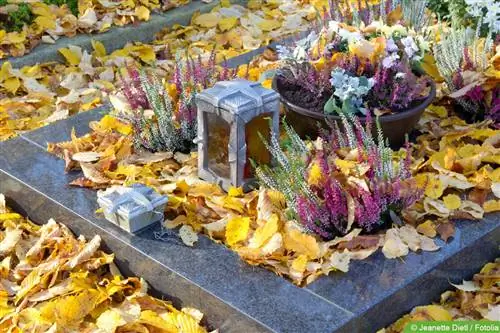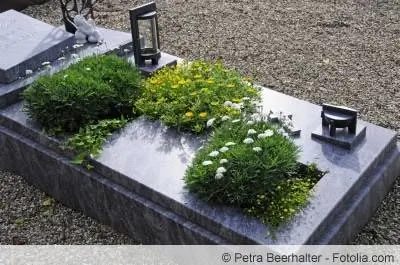- Author admin [email protected].
- Public 2023-12-17 03:39.
- Last modified 2025-01-24 12:45.
When a loved one has died, the relatives also want a well-maintained grave all year round. But not everyone can take care of the grave care themselves, for example because they are very busy at work or the grave is far away from where they live. In such a case, the local cemetery office and thus the cemetery gardener can be commissioned to take care of the grave. How high are the costs, what is the best way to proceed in such a case and can these costs be deducted from tax?
Grave design
The grave design should please the bereaved, but consideration should also be given to which plants the deceased preferred. However, since a grave is still in a communal field, the cemetery, the other surviving relatives must also be taken into account. A certain unity is desired in every cemetery, but it can vary greatly from community to community. Especially if the grave was cared for by the cemetery gardener, the cemetery gardeners adhere to the cemetery regulations and put these above the wishes of the surviving relatives if these are not compatible with the grave design guidelines. But the possible scope for implementing the individual wishes of the surviving relatives still remains quite large.
Tip:
Anyone who personally discusses their ideas for the grave bed with the cemetery gardener in advance and records them in writing can be confident that everything will be arranged according to their wishes. In this personal conversation, the gardener can also point out the cemetery's guidelines and explain why one or two wishes may not be possible.
Order grave care
In every cemetery there is a cemetery gardener who takes care of the entire complex but also the individual grave care if they are commissioned to do so. Not everyone has the opportunity to always be there and take care of the grave themselves. Even if plants that are particularly easy to care for have been cultivated on the grave, you still need to visit them often to check whether everything is still in order. If all of this is placed in the trusted hands of the cemetery gardeners who are responsible for grave care, the relatives no longer have to worry about this. Grave care includes, depending on what was contractually agreed:
- the planting, which changes according to the seasons
- fertilize and water if necessary
- removing dirt on the grave, such as weeds, leaves or branches
- If sinking damage is found, it will be repaired and, if necessary, replanted
- Pruning bushes, ground covers and small trees
- permanent arrangements or winter green as jewelry
- Grave decorations on specific, previously contractually agreed dates
- Dates can be memorial days or personal memorial days
- Grave decorations include bouquets of flowers, wreaths, plant bowls or arrangements
- This will also be contractually agreed in advance
Tip:
If all grave care is placed in the hands of the cemetery gardening department, relatives can visit a well-maintained grave at any time. Precisely because the cemetery's requirements are often strict, the grave care commissioned pays particular attention to the quality and attractive appearance of the grave bed.
Grave care costs
If grave care is commissioned by a nursery, annual costs will of course also be incurred, depending on the contractual agreement.
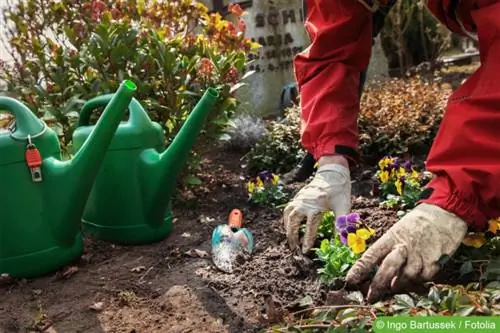
An example of what such a cost accounting could look like:
- Annual basic care for a double-digit grave about 190.00 euros
- Planting in spring, costs for plants approx. 30.00 euros
- Planting in summer, costs for plants approx. 30.00 euros
- Planting in autumn, costs for plants approx. 50.00 euros
- Costs for soil, fertilizer, mulch and peat about 28.00 euros
- Wage for planting could also be charged additionally at around 9.00 euros
- Extra costs for desired arrangements e.g. on Sunday of the Dead and/or birthday approx. 76.00 euros
In this way, the surviving relatives incur grave maintenance costs of around 400 euros per year. If these annual costs are now calculated for the long-term grave care of 25 years, then they will be around 9.200.00 euros due. But the construction of a new grave also costs around 600.00 euros, as does the renewal after 8 and 17 years, which could cost another around 600.00 euros each. These 1,800.00 euros are added again to the 9.200 euros. Long-term grave care for a double-digit grave, for example of parents or grandparents, can cost around 11,000 euros for 25 years. In addition, there are costs for the risks of subsidence and an administration fee, which must also be calculated. However, this calculation is just an example of what long-term grave care over 25 years could cost the surviving relatives.
Tax deductibility
Are the costs of grave maintenance tax deductible? Unfortunately, this question has to be answered with a resounding NO. The legislature assumes that every taxpayer has to maintain at least one grave and that almost everyone has to bear the costs for this. In this case it doesn't matter whether a cemetery gardener was commissioned to look after the graves or whether the surviving relatives look after the graves themselves. The legislature sees the costs incurred neither as household-related services nor as extraordinary burdens and therefore strictly rejects tax relief. A special exception could only be if the gravesite to be cared for is located on your own property, which, however, will be extremely rare. The funeral costs can be stated and deducted under the extraordinary expenses, but not the additional annual costs for grave care.
Take precautions yourself
Even those who do not yet have to deal with death can take precautions while they are still alive and thus relieve their survivors of a major decision. In addition to the type of burial, this also includes an indication of the desired grave planting. Through a trust provision agreement with the responsible cemetery office, the burden of the costs incurred for grave maintenance can also be relieved from the surviving relatives. The costs for grave maintenance are paid into a trust account during your lifetime. In the event of death, the cemetery gardener then takes the money from this for the agreed care of the grave.
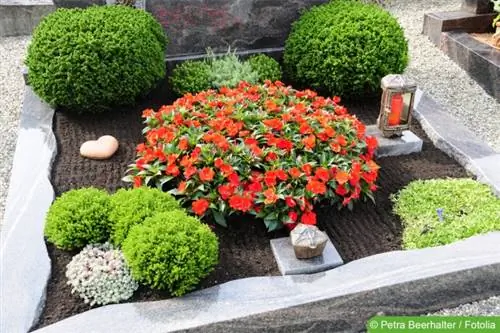
In such a case, the relatives generally do not incur any additional costs. But what should you keep in mind when planning your own precautions:
- Set up a pension contract during your lifetime
- this can be closed with a permanent grave care facility
- This permanent grave care facility commissions a contracted company on site to care for the graves
- Regular checks on the contractual services are carried out by the commissioned cooperatives or trust bodies
- In this way, the surviving dependents are spared costs and regular checks
- The trust accounts are invested seriously and for the long term
- The desired grave care over the agreed term is thereby secured
Tip:
If it is important to you what your grave will look like in the future, you should take advantage of this opportunity during your lifetime and take certain precautions. If you don't have enough money for this but don't want to burden your later survivors with the costs of maintaining the grave, you can also specify in your will that you be buried on a green meadow. This is already offered in many cemeteries, and grave maintenance is no longer necessary in such a case.
Conclusion
External grave maintenance can be expensive, but it doesn't have to be. Especially if the deceased made the decision for the surviving relatives while he was still alive and he has already personally taken care of his future grave care. In this way, there are usually no costs for the surviving relatives, as these have already been paid into a trust account for use for grave maintenance over a certain period of time. Otherwise, the surviving relatives should perhaps agree to take care of the grave on their own responsibility and to make it as easy to care for as possible. This is definitely the cheaper solution, especially if the grave is at the place of residence of a surviving relative, because every service provided by the cemetery gardening company also has a price. In addition, the costs of grave maintenance are in no way tax deductible.

